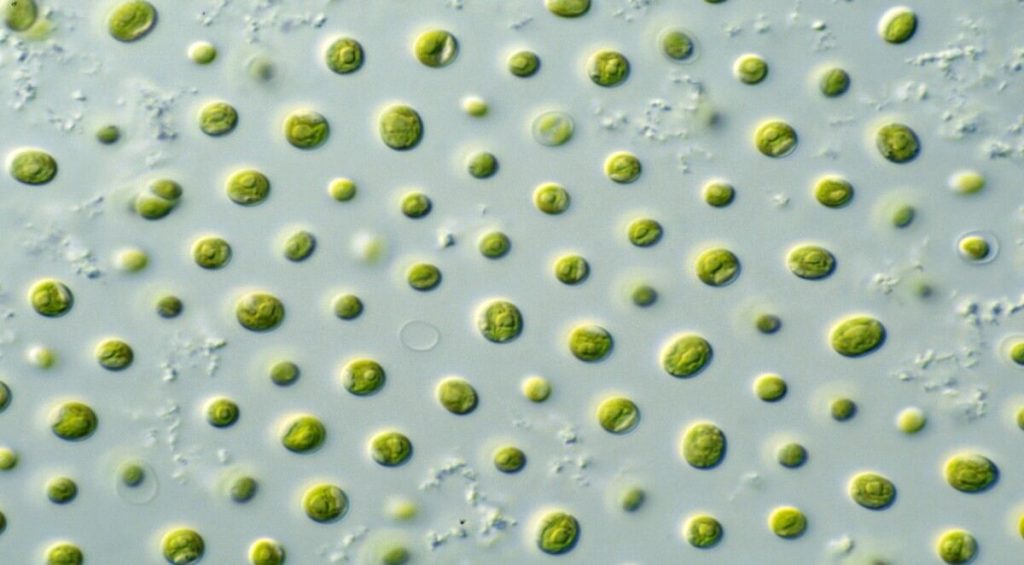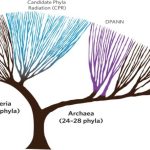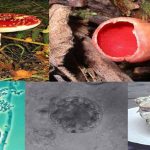Cladophora (Cladophora sp.)
Green algae, filamentous, attached.
Kingdom: Plantae; Division Chlorophyta; Class Chlorophyceae; Order Cladophorales; Family Cladophoracae. White scale bar is 5 microns.

Cells cylindrical, forming many branching filaments. Multi-walled cells – interior wall of cellulose covered by a gelatinous-like outer wall. Cells with green chloroplast and pigment bodies. Algae attached by well defined root-like structure called a holdfast.
Cell diameter 45-150, length 300 to 1,000 microns.
Closterium (Closterium sp.)
Green algae, planktonic (floater)
Kingdom: Plantae; Division Chlorophyta; Class Chlorophyceae; Order Zygnematales ; Family Desmidiaceae. White scale bar is 5 microns.

Cells curved (crescent-shaped), rarely straight, with or without median constriction. End of cells vary, pointed, blunted, or rounded. Cell wall smooth with little ornamentation; longitudinal striations. Pigments green, occasionally yellow-green.
Cell diameter: 16 – 75 x Length: 100 – 800 microns
Pediastrum (Pediastrum sp.) Greenalgae, planktonic (floater)
Kingdom: Plantae; Division Chlorophyta; Class Chlorophyceae; OrderChlorococcales; Family Desmidiaceae. White scale bar is 5 microns.

Free-floating colony of plate-like cells in the interior and exterior cells with one or two spines. The number of cells often times is characteristics of the species. Cell walls resistant to decay and many species are found in fossil condition. Cell wall may be smooth or granulated. Colony size is up to 40 microns.
Scenedesmus(Scenedusmus sp.)
Green algae, colonial, planktonic (floater) and/or periphytonic (attached)
Kingdom: Plantae: Division Chlorophyta: Class Chlorophyceae; Order Chlorococcales; Family Scenedesmmaceae. White scale bar is 5 microns.
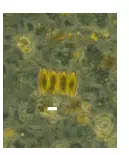
Colony usually of four cells, the two inner cells are oval to box-shaped, whereas the two outer cells have spines and may be crescent-shaped. Occasionally, some colonies maybe found with 12 or more cells Cell length 12.5 microns, width 5 microns.
Dinoflagellate(Peridinium sp.)
Planktonic (floater, able to propel itself in the water column)
Kingdom: Plantae; DivisionPyrrophyta; Class Dinophyceae; Order Peridiniales; Family Peridiniaceae. White scale bar is 5 microns
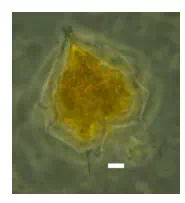
Free-swimming cells with an angular outline. Cell wall thick and with grooves appearing as lines, one across the equator, and on one hemisphere with another groove running up the longitudinal length of the cell. The hemisphere with the longitudinal groove ends with two projections. The other hemisphere ends with a single projection. The projections may be pointed or blunted. In each groove is a flagella. Cells usually always solitary. Cell length 32, width 21 microns.
Chroomonas(Chroomonas sp.)
Planktonic (floater, able to propel itself in the water column)
Kingdom: Plantae ; Division Uncertain status; Class Uncertain status; Order Cryptomonadales; Family CryptochrysidaceaeWhite scale bar is 5 microns
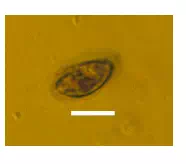
Tear-drop shaped cells with two unequal lengthen flagella are attached towards the pointed end of the cell. Flagella two to three times length of cell. Eyespot may be present, two or three blue-green to bluish chloroplast bodies may be present. Cell length 13, width 7 microns.
Chlamydomonas (Chlamydomonas sp.)
Flagellate. Planktonic (floater, able to propel itself in the water column)
Kingdom: Plantae; Division Chlorophyceae; Class Volocales Order Family Chlamydomonadaceae. White scale bar is 5 microns
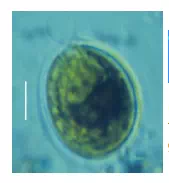
Cells round to oval in shape, with one cup-shaped chloroplast and one or more chloroplastid body. Eye-spot may be present. Two flagella usually of equal length, attached in the cup-shaped chloroplast area. Cell usually covered in a clear to semi clear gelatinous-like layer. Some 500 plus species have been identified. Cell diameter 5 to 10 microns.
Phacus (Phacus sp.)
Flagellate. Planktonic (floater, able to propel itself in the water column) or periphytonic (attached)
Kingdom: Plantae; Division Euglenophyta; Class Euglenophyceae; Order Euglenales; Family Euglenaceae. White scale bar is 5 microns
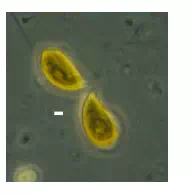
Solitary free-swimming. Cell top-shaped with a longitudinal spiral with a rigid shape. Cell wall often with dot-like ornamentation arranged in the longitudinal axis. Single flagella attached in a gullet at the rounded end of the cell. One or two ring-like bodies located within the center of the cell. Eyespot may be present in some species.
Euglenoid (Eutreptia sp.)
Flagellate. Planktonic (floater, able to propel itself in the water column)
Kingdom: Plantae; Division Euglenophyta; Class Euglenophyceae; OrderEuglenales; Family Euglenaceae. White scale bar is 5 microns
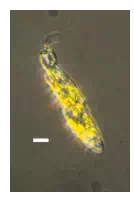
Cell shape variable, though usually an elongated tear-drop to pear-shaped to stubby pencil-shaped. Cell wall ornamented with small dot-like lines arranged length-wise to cell body, though spirally twisted. Two equal lengthed flagella attached at the rounded end of the cell, in the area of the gullet. Gullet is generally present; as are vacuoles. Cell diameter 23, length 178 microns.
